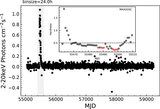Estimating the Spin of the Black Hole Candidate MAXI J1659-152 with the X-Ray Continuum-fitting Method
Abstract
As a transient X-ray binary, MAXI J1659-152 contains a black hole candidate as its compact star. MAXI J1659-152 was discovered on 2010 September 25 during its only known outburst. Previously published studies of this outburst indicate that MAXI J1659-152 may have an extreme retrograde spin, which, if confirmed, would provide an important clue as to the origin of black hole spin. In this paper, utilizing updated dynamical binary system parameters (i.e., the black hole mass, the orbital inclination, and the source distance) provided by Torres et al., we analyze 65 spectra of MAXI J1659-152 from RXTE/PCA, in order to assess the spin parameter. With a final selection of nine spectra matching our f sc ≲ 25%, soft state criteria, we apply a relativistic thin disk spectroscopic model kerrbb2 over 3.0-45.0 keV. We find that inclination angle correlates inversely with spin, and, considering the possible values for inclination angle, we constrain spin to be -1 < a * ≲ 0.44 at a 90% confidence interval via X-ray continuum fitting. We can only rule out an extreme prograde (positive) spin. We confirm that an extreme retrograde solution is possible and is not ruled out by considering accretion torques given the young age of the system.
- Publication:
-
The Astrophysical Journal
- Pub Date:
- February 2022
- DOI:
- 10.3847/1538-4357/ac4163
- arXiv:
- arXiv:2112.03479
- Bibcode:
- 2022ApJ...925..142F
- Keywords:
-
- 159;
- 1810;
- 1852;
- Astrophysics - High Energy Astrophysical Phenomena
- E-Print:
- 16 pages, 8 figures, 5 tables
